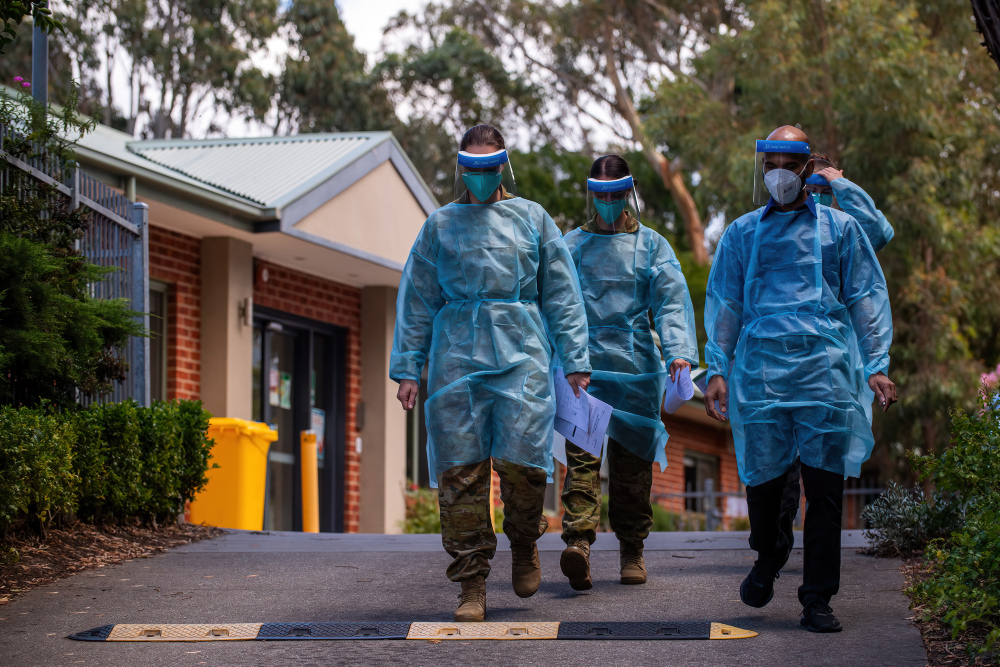
Prime Minister Scott Morrison announced on Monday that
1,700 Australian Defence Force personnel will be deployed to support the aged care sector. The intent is to provide immediate assistance with managing Covid-19 outbreaks and alleviating staffing shortages in residential care facilities. While Defence nurses will be deployed to work in medical care, other personnel will screen entrants to facilities, provide companionship and deliver meals to residents, and perform other non-direct care functions to ‘take the pressure off qualified aged care workers and medical staff’.
This announcement comes after many years of concern about the level of care the elderly receive in aged care facilities. Covid has exacerbated those concerns and many others, but how can the ADF be the only answer we have to every national emergency question? And what do we risk losing by continuing to utilise well-trained and professional ADF personnel for seemingly anything other than what they are trained for?
The visible crises in the healthcare, aged care and education sectors, to name just a few, have been decades in the making. Our supply-chain deficiencies and sovereignty challenges have intensified during Covid, but they have been exacerbated by short-term thinking and poor decisions long ago.
ADF personnel are being pulled in all directions—carrying bags at airports, doorknocking in Sydney’s west during Covid outbreaks and in Canberra’s southern suburbs during bushfires, running the vaccination rollout, and now cooking and cleaning in aged care facilities. The impact of this on ADF personnel in the long term isn’t well understood, but the possibility exists that it will harm the sense of purpose that many ADF members hold dear.
The implications for ADF retention and recruitment are worrying. While the separation rate for the permanent force at 30 June 2021 was
9.5% and is consistent with the previous four-year average, it remains to be seen whether there will be an increase in separations and a widening gap in recruitment.
The Australian community has a deep respect for the ADF. But we won’t do the ADF any favours if we continue to expose them to situations outside their training or expertise. And we risk the emergence of not so much a police state, but one excessively dependent on the military.
We’ve failed to listen and respond to the concerns raised by experts in other sectors. There appears to be a return to the lack of confidence in our specialists that was prevalent in pre-Covid times. The many comparisons in recent weeks between the wages earned by those working in the aged care sector and the earnings of those in retail and other (better paid) sectors provide tangible evidence of what the nation values. It’s the same debate that occurs when we consider the contribution of teachers, nurses and childcare workers. Introducing a differently trained, differently remunerated workforce into a poorly paid, chronically stretched and exhausted workplace will create other problems no matter how good the intentions.
The ADF, state emergency services, volunteer fire services and any number of other organisations, including the Red Cross and St John Ambulance, all know that a surge workforce needs to be trained and able to contribute effectively prior to an emergency arising. Such training is often provided over long periods to develop the instinctive responses needed in times of emergency. Failure to provide appropriate training not only results in the surge workforce being ineffective but it also has the potential to put others in harm’s way.
Applying a band-aid to problems created over a long period that have been aggravated by a pandemic establishes the potential for severe flow-on impacts.
But that’s the crux of this crisis and those in other sectors. If you accept the need to pre-train a surge workforce, then you’re accepting that there is a problem in that sector. In the case of aged care, family members and community organisations (which already visit these facilities) are better placed than strangers to assist the elderly. The most vulnerable in our community need to be comforted by people they know.
Covid has highlighted many areas that need more attention, better decision-making and longer-term thinking. At some point soon we need to extract ourselves from a situation where we lurch from one crisis to another with a short-term fix in hand, and act for the long term.
I have no doubt the ADF personnel will do what they can to assist the aged care sector. They will apply the highest level of professionalism and dedication. But we need to stop expecting them to fill every gap created by decisions that are letting the country down.
 Print This Post
Print This Post